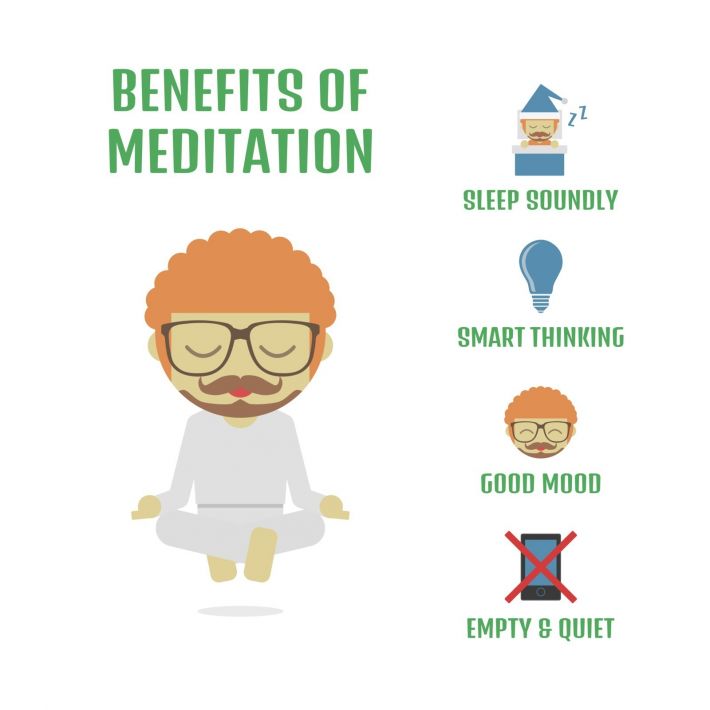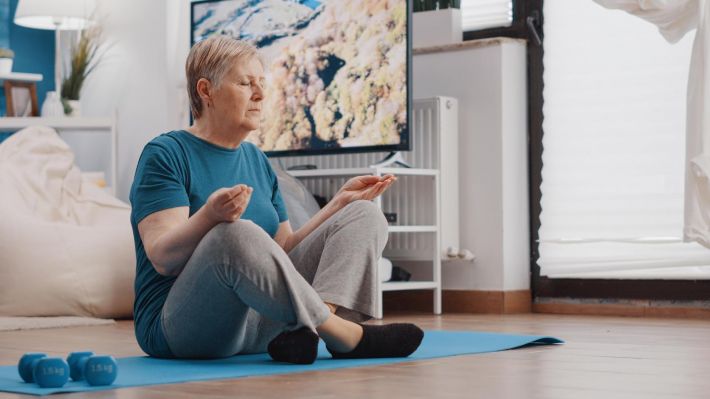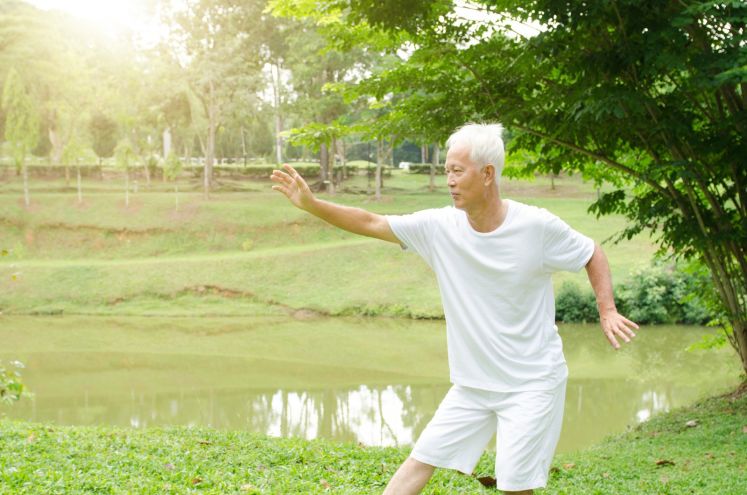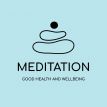- in Mental Health by Tony
- |
- 1 comments
What Are The Benefits Of Meditation

Many people are fatigued in today’s stressed out, distracted society and find life in the rat race frustrating. Few of us know what it feels like to slow down and be deliberate about actions and thoughts. Meditation can help you regain control in your out-of-control world.
Physical health is intertwined with mental health in a bidirectional fashion. Scientific evidence shows that changes in thinking patterns and behaviours affect neurological, endocrine, and immune systems. Contrarily, disruption in these biological systems negatively impacts on your mental health.
More...
Helps Reduce Your Stress
When you are stressed, your body releases the stress hormone cortisol. You may find you have insomnia, anxiety, and increased blood pressure. Meditation helps reduce your stress and the amount of cortisol released in your body.

Lessens Anxiety in Some
Stress can increase anxiety in some people. As they learn some meditation techniques to reduce stress, they will also lower their anxiety levels. It helps you cope better in those anxiety-triggering situations.
Five Signs That You’re Experiencing an Anxiety Attack
Positive Increase of Your Emotional Health
A consistent meditation practice can improve your self-image and increase your positive outlook on things. In general, you will experience fewer negative thoughts as you grow in the course of meditating.
Become More Self-Aware
Understanding yourself enables you to make better decisions and improve your life, and it also helps you relate to others around you. You can learn more about yourself, what makes you tick, and increase your problem-solving skills by meditating.
Increase Your Attention Span
Can you hold a thought for longer than 30 seconds? Many cannot. Enter the discipline of focused-attention meditation. With regular practice, you may find your attention span lasts longer than your two-year-old for the first time in months.
Improve Your Memory
If you want to fight off age-related memory loss and dementia, meditation may be precisely what you need. It helps improve your focus, memory, and mental clarity and is an excellent tool to keep your mind sharp.
Sleep Better at Night
Besides reducing stress and increasing your memory, you may find that you fall asleep faster in the evening. You learn to reign in your runaway thoughts that can keep you awake at night. It is all about relaxing your mind and body for a better night’s sleep.
Increase Your Empathy with Others
Depending on the type of meditation you choose, you may find that your feelings of kindness and empathy grow. You will learn to extend forgiveness to others and even yourself.
Fight Your Addictions
Addiction affects your life and relationships, whether it is alcohol, drugs, sugar, or food. Some types of meditating can help you learn to redirect your attention, emotions, and impulses. You will also better understand what is behind your addiction to overcome it.
Meditation practice

Mindfulness and Meditation, companions on your journey throughout life
There are six popular types of meditation practice:
- Mindfulness meditation.
- Spiritual meditation.
- Focused meditation.
- Movement meditation.
- Mantra meditation.
- Transcendental meditation.
Meditation through movement

Tai Chi And Qi gong are mind-body exercises originating in China and practised worldwide. Both involve coordinated slow flowing movement and deep rhythmic breathing while cultivating a calm meditative state of mind.
The activities are thought to facilitate energy flow (qi) and balance mind, body, and spirit. Tai Chi is typically more complex, with a series of “forms” or specific postures and movements, and is considered a martial art.
Qi gong often repeats simple movements, is more adaptive, and is utilized as a wellness practice. The elements of mental concentration, relaxation, and physical balance make Tai Chi and Qi gong potential therapeutic practices for mental health benefit.
Meta-analyses of 49 peer-reviewed case studies evaluated depression, and reported a significant positive relationship between practising Tai Chi or Qi gong and improved outcomes of depression.
Visual Meditation
Visualization meditation is a technique focused on enhancing feelings of relaxation, peace, and calmness by visualizing positive scenes, images, or figures.
This practice involves imagining a scene vividly and using all five senses to add as much detail as possible. It can also involve holding a beloved or honoured figure in mind with the intention of embodying their qualities.
Another form of visualization meditation involves imagining yourself succeeding at specific goals, which is intended to increase focus and motivation.
Many people use visualization meditation to boost their mood, reduce stress levels, and promote inner peace.

Meditation
A quote attributed to Gautama Buddha (500 B.C.) is “To keep the body in good health is a duty... otherwise we shall not be able to keep our mind strong and clear.”
Yoga and Meditation

The practice of yoga is a several thousand years old tradition originating in ancient India. It is popular throughout the world as a form of exercise, moving meditation, and complementary therapy for a number of conditions.
The word “yoga” has similar roots to the word “yoke” – meaning to “tie together” mind, body and spirit. Hatha Yoga is the physical branch of yoga most people are familiar with, and consists of assuming various postures called “asanas,” combined with breathing and body awareness, typically in a sequence.
When we practice yoga and meditation, we raise our consciousness. This is because yoga helps us to bring the body to a state of calm by dissipating the restless energy we carry around.
In addition to its spiritual aspects, yoga is designed to promote strength, flexibility, self-control, relaxation, and endurance.
What is mindfulness?
Professor Mark Williams, former director of the Oxford Mindfulness Centre, says that mindfulness means knowing directly what is going on inside and outside ourselves, moment by moment.
"It's easy to stop noticing the world around us. It's also easy to lose touch with the way our bodies are feeling and to end up living 'in our heads' – caught up in our thoughts without stopping to notice how those thoughts are driving our emotions and behaviour," he says.
"An important part of mindfulness is reconnecting with our bodies and the sensations they experience. This means waking up to the sights, sounds, smells and tastes of the present moment. That might be something as simple as the feel of a banister as we walk upstairs.
"Another essential part of mindfulness is an awareness of our thoughts and feelings as they happen moment to moment.
"It's about allowing ourselves to see the present moment clearly. When we do that, it can positively change the way we see ourselves and our lives."

How mindfulness helps mental wellbeing
Becoming more aware of the present moment can help us enjoy the world around us more and understand ourselves better.
When we become more aware of the present moment, we begin to experience afresh things that we have been taking for granted.
"Mindfulness also allows us to become more aware of the stream of thoughts and feelings that we experience," says Professor Williams, "and to see how we can become entangled in that stream in ways that are not helpful.
"This lets us stand back from our thoughts and start to see their patterns. Gradually, we can train ourselves to notice when our thoughts are taking over and realise that thoughts are simply 'mental events' that do not have to control us.
Most of us have issues that we find hard to let go, and mindfulness can help us deal with them more productively. We can ask: Is trying to solve this by brooding about it helpful, or am I just getting caught up in my thoughts?
"Awareness of this kind also helps us notice signs of stress or anxiety earlier and helps us deal with them better."
Mindfulness is recommended by the National Institute for Health and Care Excellence (NICE) as a way to prevent depression in people who have had 3 or more bouts of depression in the past.
Conclusion

Investigate the different meditation methods and decide what will work for your specific need. Many meditation approaches focus on various aspects of life, and you may need to try several before you find what works for you.
Please choose an area of your life you want to improve and focus on it. If you are stressed, cannot sleep, and are addicted to sugar, you may cause more frustration if you split your time between all three. Start with one area, master it, and then move to the next area of life you want to improve.
Look for apps, videos, or a counsellor. Technology makes it possible to meditate independently, and you can find apps and videos to meet your needs.
Alternatively, you may benefit from counselling that includes meditation techniques.

Further Reading
Free Copy
https://www.johnwbrickfoundation.org/move-your-mental-health-report/
https://www.madinamerica.com/2019/03/mental-health-concerns-not-brain-disorders-say-researchers/
https://www.apa.org/pubs/journals/features/teo-0000023.pdf
Publications
Meditation for Fidgety Skeptics
https://www.amazon.com/Meditation-for-Fidgety-Skeptics-audiobook/dp/B075DLMD18/
Practising Mindfulness
https://www.amazon.com/Practicing-Mindfulness-Essential-Meditations-Everyday/dp/1641521716/
Meditation for Beginners
https://www.amazon.com/Meditation-Beginners-Practical-Quieting-Improving/dp/B09FC86K6K/
The Daily Stoic
https://www.amazon.com/Daily-Stoic-Meditations-Wisdom-Perseverance/dp/0735211736/
Meditations on Self-Love
https://www.amazon.com/Meditations-Self-Love-Wisdom-Healing-Acceptance/dp/1647399491/





[…] imagine, if culture can influence our inner voice, how might we learn to access this through meditation or any other therapeutic self-help […]